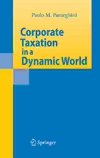
Corporate Taxation in a Dynamic World PDF
235 Pages·2007·2.684 MB·English
Most books are stored in the elastic cloud where traffic is expensive. For this reason, we have a limit on daily download.
Preview Corporate Taxation in a Dynamic World
Description:
This book analyzes the economic principles of modern corporate taxation. With respect to the existing products it represents a novelty in at least two respects. First of all, it analyzes not only the effects of taxation on firms' marginal choices, but also focuses on the impact of taxation on discrete choices, such as plant location, R and D investment, and new marketing programs. The second novelty is represented by the application of option pricing techniques to corporate taxation. To give an idea of the importance of options it is sufficient to say that managers are aware that new business programs are an opportunity and not an obligation. This means that they behave as if they owned option-rights. Due to the partial irreversibility of their choices, they know that the exercise of such options reduces their business flexibility.
See more
The list of books you might like
Most books are stored in the elastic cloud where traffic is expensive. For this reason, we have a limit on daily download.
